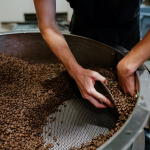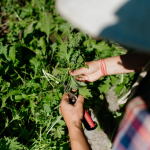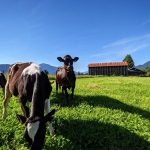Nanoose Edibles
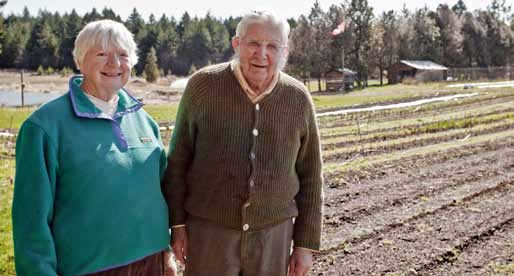
Hannah Roessler
It Takes Dedication, Devotion, and a Community to Raise a Farm
I had been trying for weeks to make it to Nanoose Edibles Farm to visit Barbara and Lorne Ebell, but bad weather on the Malahat Highway turned me back each time. The day I finally made it was sunny and warm, and I could barely contain my excitement.
I’d recently read an interview with Barbara Ebell in a local paper, explaining the hardships encountered by farmers on Vancouver Island; it was a deliciously blunt article, and she caused quite a few ripples. I had heard great things about this remarkable woman, but nothing quite prepared me for the amazingly accomplished yet humble person I met. “I’m a farmer and I really like to farm,” says Barbara, “but I’m always under pressure to do more. People have been phoning me since that article saying ‘now what are we going to do?’”
It’s understandable that folks are approaching the Ebells for solutions. Barbara and her husband Lorne Ebell have a successful farm business…which they started only after successful careers in forestry and agriculture. Over tea and cookies, we discussed their fascinating farm backgrounds, and it’s clear that agriculture has always run deep for them; it’s in their blood.
Barbara’s mother was born on a large estate farm in England, and her Swedish father emigrated to Golden, BC, where the family sold farmed vegetables and fruit, fish from the Columbia River, and wild game to the CPR. Lorne, an agriculturalist through and through, attended school in Manitoba and Alberta before taking a job in the Ministry of Forestry. After several years of working in the Canadian government, Barbara and Lorne moved to Liberia, Africa where Lorne was Head of Botanical Research for the Firestone Rubber Company. They spent seven years in Liberia, working on a huge plantation housing 13,000 residents.
As Barbara recalls, “The women were excellent farmers and wonderful marketers. My collards were only regular size and theirs were the size of small bushes!” I find myself thinking that Barbara could probably grow collards the size of trees if she wanted to, but I don’t say that.
After a brief stint working in Guatemala, and then several years in the state of Bahia in Brazil, they returned to Canada where Lorne went back to working in Forestry Research and Barbara took a position with the Ministry of Agriculture in the Policy Branch. After the adoption of Canada’s Employment Equity Act in 1986, provincial governments followed suit and Barbara became the first Manager of Women’s Programs for the Ministry of Agriculture to help “push the envelope” of women’s advancement in the government.
I find myself thinking that Barbara could probably grow collards the size of trees if she wanted to, but I don’t say that.
As they crept closer to retirement age they began to contemplate what their next steps would be, “We thought…hmmm, what should we do now? Well, we’ve got farming in our blood, so we should farm!” says Barbara with a laugh. Walking around their beautiful farm, I’m having trouble resolving my image of “retirement” with the dug pond, drained land, tool wizardry shop, seed saving shed, greenhouses, seedling carousel, orchard, blueberries, and more. Lorne describes how they started farming on weekends and holidays, driving up from work in Victoria to clear 12 arable acres of blackberries and roses… and I am firmly set in my feeling of awe.
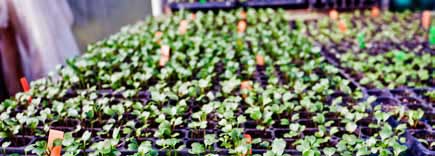
Everyone on the Farm Needs to Farm
Early on they focused on strawberries, which their daughter advised them to price at five dollars a pound because “if we don’t start that high people will never pay more… and we can’t really go up from that even today!” says Barbara with a smile. “But we can sell every strawberry we produce. We started with the assumption that we would grow high-end organic food, because otherwise you’re just producing cheap food for people and working your head off! And you’re not really getting anywhere.”
Barbara and Lorne were among the first island farmers to sell direct to local restaurants. They were ahead of the game in the early days, but sales have started to drop as big box stores mushroom up all along the highway headed up island. They have a beautiful and successful on-farm market — people come from far and wide to buy their produce, and customers are encouraged to walk around the farm and have a look at what’s growing. They sell their vegetables, plants, and eggs, as well as grain, flours, homemade soups, honey, fish, salad mix, and cookies (that I ate several of), and much more, and they are open every day during the summer time. Profits from their off-farm sales (CSA and farmers markets), farm sales, and restaurants are roughly equal.
If you have your fingernails painted gold, well, that might make you think twice about farming.”
When I asked if they hire retail help, Barbara firmly stated, “Everyone on the farm, needs to farm. Can’t be a bookkeeper or a vendor or answer the phone without knowing how to farm, otherwise you can’t possibly answer a question intelligently about the produce or do your job properly. If you have your fingernails painted gold, well, that might make you think twice about farming.”
She says this with a hearty laugh and her blue eyes twinkle something fierce, and I glance down and take comfort from my own dirty fingernails and calloused hands.
Building the Future: A Farmers’ Co-operative
“You get these really wonderful people working for you, and you can’t pay them minimum wage! You have to honor what they are doing. This year we are setting the foundation for a farmers’ cooperative so that by next year they [the workers] will be running the farm, not us. We will stay on as members so we can help them make decisions. We might come have a peek to make sure they are getting things right and sticking to the program. The idea is to put the farm itself into a partnership,” explains Barbara.
Succession planning is tough for many farmers, and though it is clear that the Ebell family is an environmentalist gang, and everyone loves the farm, each family member is out doing other things in the world. Putting the farm into a partnership promises to be an exciting way forward to keep this land producing food for a very long time.
Although partnerships can also be difficult to navigate, the Ebells are clearly grateful for their farm workers. Barbara is generous with praise, pointing out things on the farm that different workers have done or made. As she says, “You can have all the education in the world, but if you’re not practical on the ground you can’t be paid for the fact you went to university — not on a farm. You have to be paid for what you actually produce.” This honoring of practical skill sets is echoed in the meticulous attention to detail in their well-designed farming systems. Lorne’s mechanical and technical acumen is astonishing; walking into his workshop is like walking into a wizard’s den.
Nurturing the Land is Everyone’s Responsibility
Barbara believes that while farmers are here to grow food for people in the community, it’s the community’s responsibility to ensure that continues. As she says, “That is the missing piece of the equation if you really think about it. Farmers have to keep producing, set proper prices for themselves, make sure there is enough supply for people to buy – but the rest is not the farmer’s responsibility, it’s a social responsibility. Public participation and advocacy doesn’t really happen. And if you don’t push it or fight for it, it just won’t happen.”
Barbara has many great ideas for the future of farming — more education, apprenticeships, more support from the public— but it’s hard to take all these things on while farming at the same time. “If you go anywhere else in the world, you’ll see it happen — the farmer farms! You don’t have to get all gussied up and see the premier, and tell them they should be buying your vegetables!” But their example is inspiring — talking with Barbara has the distinct effect of making me want to visit the Premier immediately to demand better agricultural policies. While wearing my farming clothes. No gussying.
Their example is inspiring — talking with Barbara has the distinct effect of making me want to visit the Premier immediately to demand better agricultural policies.
On the drive back to Victoria I’m thinking about many things, mainly about how great it has been to hang out with such an amazing woman in agriculture. She ended our visit with this wonderful piece of advice, “Farming just gobbles up your life and your time, so you need to have other loves in your life. If you run into a really long tedious spell and you are frozen in for 3 or 4 months, you start to really think ‘I don’t like this.’ It’s not because you don’t like farming – it’s because you don’t like your life! Ha! And in the summertime you are working like hell, but you need to socialize. You know that what you do is crazy, but you don’t feel as crazy when there are others there with you; you need to make fun of it.”
And with that she gives a little nod, and as I share a smile with this twinkling-eyed wise woman, I think about all we can learn from her.
Check out the many videos on the Nanoose Edibles Youtube channel!
Hannah Roessler has farmed in Nicaragua, Washington, and BC on permaculture farms, polyculture cafetals, organic market farms and a biodynamic vineyard. She has an MA in Environmental Studies, and her research is focused on climate change and small-scale organic farming. She currently farms on the Saanich Peninsula on Vancouver Island.


